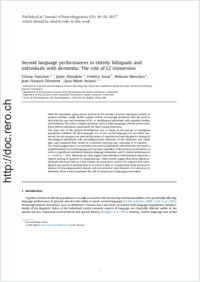Second language performances in elderly bilinguals and individuals with dementia: The role of L2 immersion
- Nanchen, Giliane Laboratory for Cognitive and Neurological Sciences, Neurology Unit, Department of Medicine, Faculty of Science, University of Fribourg, Switzerland - Department of Neurosciences Centre Hospitalier Universitaire Vaudois, Lausanne, Switzerland
- Abutalebi, Jubin Centre for Neurolinguistics and Psycholinguistics, University San Raffaele, Milan, Italy
- Assal, Frédéric Departments of Neurosciences, Geneva University Hospitals and Faculty of Medicine, Switzerland
- Manchon, Mélanie Laboratory for Cognitive and Neurological Sciences, Neurology Unit, Department of Medicine, Faculty of Science, University of Fribourg, Switzerland
- Démonet, Jean-François Department of Neurosciences Centre Hospitalier Universitaire Vaudois, Lausanne, Switzerland
- Annoni, Jean-Marie Laboratory for Cognitive and Neurological Sciences, Neurology Unit, Department of Medicine, Faculty of Science, University of Fribourg, Switzerland
-
01.08.2017
Published in:
- Journal of Neurolinguistics. - 2017, vol. 43, p. 49–58
English
With the population aging and an increase in the number of senior immigrant citizens in modern societies, public health systems will be increasingly burdened with the need to deal with the care and treatment of bi- or multilingual individuals with cognitive decline and dementia. This raises complex questions such as which language is better preserved in these elderly individuals, particularly for those facing dementias. The main aim of the present investigation was to study in two groups of immigrant populations whether the first language (L1) or the second language (L2) are better preserved. For this purpose, we assessed by means of cognitive and neurolinguistics testing 20 late-bilingual individuals with neurodegenerative dementia of the Alzheimer and mixed type, and compared their results to a matched control group consisting of 19 subjects. Our results suggest that L1 is not better preserved in individuals with dementia. We report a parallel decline of second language across groups, regardless of the presence of dementia, as well as a significant correlation between language immersion and L2 relative performances (r = 0.379, p = 0.03). Moreover our data suggest that individual with dementia may have a relative sparing of syntactic L2 comprehension. These results suggest that these elderly individuals who have lived in a host country for many years, such as the subjects here investigated, may preserve similarly their L2 as much as their L1, irrespectively of the presence or absence of neurodegenerative disease, and even preserve some features of L2 processes in dementia. These results emphasize the role of immersion in language preservation.
- Faculty
- Faculté des sciences et de médecine
- Department
- Médecine 3ème année
- Language
-
- English
- Classification
- Biological sciences
- License
- License undefined
- Identifiers
-
- RERO DOC 305092
- DOI 10.1016/j.jneuroling.2016.09.004
- Persistent URL
- https://folia.unifr.ch/unifr/documents/305884
Statistics
Document views: 86
File downloads:
- ann_slp.pdf: 580
